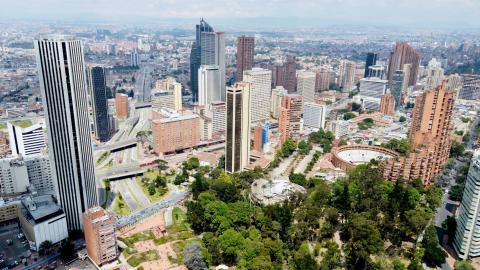
Who bears the brunt of the energy transition?
What the energy transition’s demand for minerals means for mining communities
For citizens of countries rich in transition minerals, a mining boom could bring jobs and economic opportunities. But if not managed well, it could do more harm than good, disrupting traditional livelihoods and the environment.
As the energy transition drives demand for minerals used in low-carbon technologies, many resource-rich countries are anticipating an uptick in mining investment. Local stakeholders could benefit from the sector’s growth, provided there is multi-stakeholder dialogue and transparency in how the sector is managed. Conversely, poor governance could impede sustainable local development and harm communities.
A new report, commissioned by the EITI and produced by the Sustainable Minerals Institute at the University of Queensland, highlights the key risks and opportunities that transition mineral extraction could bring to local communities.
Balancing new jobs with traditional livelihoods
An increase in minerals demand could push mining into more environmentally and socially sensitive areas. Among 700 active mineral projects in EITI countries, about 80% are located on territories of Indigenous or other land-connected peoples and 50% overlap with conservation areas, according to the report.
As governments rush to approve new mines in order to capitalise on the sector’s economic potential, there is a risk that regulators and companies cut corners in consultation processes and impact assessments, which could harm communities and the environment. Water is likely to be a particularly important flashpoint, and women and girls are typically disproportionately impacted when mines reduce community access to water. In Argentina, for example, water-intensive methods for lithium mining have driven community concerns over the sector’s growth.
To mitigate these risks, governments and companies should engage in meaningful consultations and conduct proper impact assessments, even if they are eager to see new mines approved quickly. Civil society groups can work with communities to strengthen understanding of the risks and opportunities associated with mining investments – for example on subnational revenues, social payments and environmental impacts.
Supporting responsible sourcing
Several minerals used in low-carbon technologies are known to be produced through artisanal and small-scale mining (ASM). ASM is often informal, poorly regulated, and sometimes illegal under the mining frameworks of certain countries. Still, ASM employs an estimated 44.6 million people globally, with millions more relying on incomes generated from this activity. Rising commodity prices may set off a rush in ASM and expand it further. The Democratic Republic of the Congo, for example, has seen boom-and-bust cycles in the past in ASM production of copper and cobalt.
A rapid increase in ASM activity could cause environmental damage, threaten public health and safety, and drive conflict. High prices could also drive smuggling and fake certification of ASM minerals, making it harder for downstream companies to meet their responsible sourcing commitments. While these impacts are not exclusive to ASM, the push to secure supply at all costs could exacerbate existing risks. Failure to address these issues can, in turn, pose a barrier for securing the minerals needed to advance the energy transition (e.g. decreased investment in ASM to avoid legal and reputational risks; local opposition to mining activity; and shut down or shake down of mine sites due to conflict, among others).
With lower start-up costs than industrial mining, artisanal miners are often well positioned to target high-grade material and quickly switch between different commodities. As such, the sector will likely be indispensable for meeting demand. For communities, ASM revenue typically provides a more direct source of income, especially in countries with governance issues.
To help foster a responsible trade in artisanally produced minerals and maximise its contribution to local economies, the EITI and OECD have developed resources for mid and downstream buyers of ASM-produced minerals to identify and address risks, as well as to foster synergies between sustainable development objectives and a reliable supply of transition minerals. The EITI’s new guidance, produced in partnership with the OECD, highlights how disclosures and multi-stakeholder dialogue can help improve oversight and formalisation of ASM.
Meaningful stakeholder engagement is a critical aspect of due diligence in order to avoid some of the potential adverse impacts of extractive operations, as well as to optimise potential positive contributions. The OECD’s Due Diligence Guidance for Meaningful Stakeholder Engagement provides an assessment framework for industry to evaluate their stakeholder engagement performance and targeted guidance for specific stakeholder groups such as indigenous peoples, women, workers and artisanal and small-scale miners.
Strengthening local capacity
For many local governments, production of transition minerals offers the prospect of economic advancement through a share of mining royalties and other revenue streams, infrastructure development, job creation and procurement of local goods and services. But realising this potential is difficult, particularly when local governments are under-capacitated. In Peru, for example, but also in many other countries, a lack of financial acumen is hampering local governments from optimising royalty payments from the mining sector, with reports of funds being misappropriated or wasted. Despite significant payments, some mining communities do not have access to basic amenities, such as sewage, water treatment or paved roads.
EITI reporting can help shed light on the mining revenues that are allocated to local governments. The EITI’s guidance outlines concrete steps that countries can take to improve their reporting on licensing, production and exports, tax payments and environmental and gender impacts. With better data, governments will be better equipped to maximise the sector’s contribution to the economy.
Mining companies can also play a role in supporting capacity building and financial management training for local governments and communities on spending revenues and corporate social investments effectively. Furthermore, data on mining revenues can support due diligence processes, expose anomalies in payments to local governments, and help direct risk mitigation efforts and investment to responsible sources of supply.
---
Global efforts to fight climate change are reshaping the mining sector and are having deep implications for communities and local governments. This is creating a new urgency for accountability and good governance. The voices of local stakeholders must be heard in order to ensure the energy transition benefits everyone.
Mission critical: Strengthening governance of mineral value chains for the energy transition
This report provides an overview of global value chains of transition minerals, as well as governance risks and opportunities.
Related content





